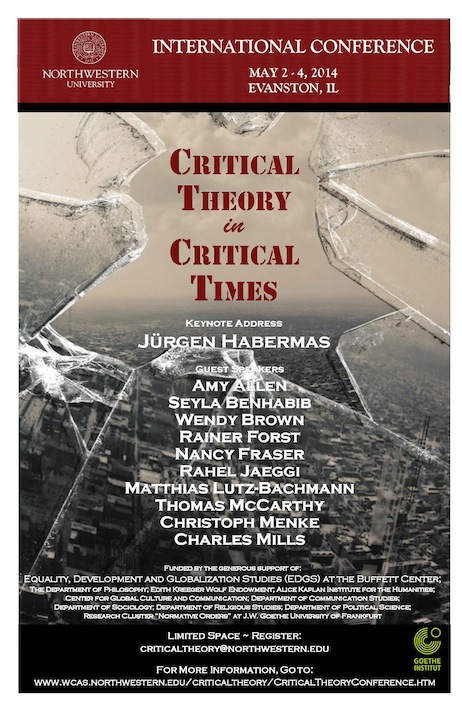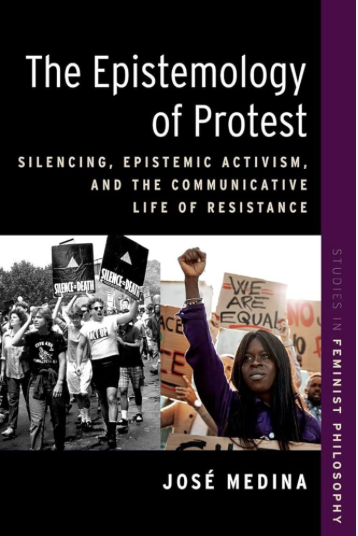Past Critical Theory in Critical Times Workshops
critical theory in critical times workshop
Spring 2023 Workshop: Epistemology of Protest: Silencing, Epistemic Activism and the Communicative Life of Resistance, with José Medina
Friday, May 19, 2023
3:30pm - 6:30pm CST
Location: Harris Hall 108, 1881 Sheridan Rd, Evanston, IL 60208
The 2023 Critical Theory in Critical Times annual series workshop will focus around the work of José Medina (Walter Dill Scott Professor of Philosophy at Northwestern University) and, in particular, his forthcoming book The Epistemology of Protest: Silencing, Epistemic Activism and the Communicative Life of Resistance. José Medina will discuss this work with four commentators.
|
The Epistemology of Protest: Silencing, Epistemic Activism and the Communicative Life of Resistance |
The Epistemology of Protest offers an account of communicative and epistemic resistance against injustice in street activism and protest movements. The book examines the communicative power of protest to break social silences, to disrupt complicity and insensitivity, and to create new forms of social sensibility. It defends a pluralistic and contextualist communicative approach to protest that pays special attention to the polyphony of protesting publics and the radical political imagination contained within protest movements. This pluralistic and contextualist approach focuses on protest movements that fight for the liberation of oppressed communities, especially Abolitionism, the Civil Rights movement, Black Lives Matter, the Queer Liberation movement, and contemporary feminist movements. The book analyzes the communicative and epistemic injustices that protest acts and protest movements face, examining different kinds of silencing that protesting voices face and how those different forms of silencing can be resisted. The book also identifies four different communicative dimensions in protest acts and analyzes the different kinds of expressive and speech acts that can be performed in these four communicative dimensions: the expressive/performative, the testimonial, the evaluative, and the prescriptive dimension. Along these dimensions, the book analyzes different forms of communicative power and communicative agency: the creative power to constitute a collective (communicative and epistemic) agent, the communicative power/agency to give collective testimony (including radical testimony), the communicative power/agency to develop critical discourses (including radical critique), and the communicative power/agency to generate prescriptive orientations and demands for justice (including radical demands). The book’s theory of protest examines the obligations that society and its institutions have to give proper uptake to protests and to communicatively engage with protesting publics in all their diversity, without excluding or marginalizing radical voices and perspectives. Throughout the book, communicative and epistemic arguments are given for the value of imagining with protest movements and of taking seriously the radical political imagination exercised in social movements of liberation |
Spring 2022 Workshop with Nadia Urbinati, Me the People: A Discussion on Populism
Program
Summer 2021 Workshop with Christoph Menke, Critique of Rights
2020-2021 virtual Workshop: Critique of Latin American Reason by Santiago Castro-Gómez
2019-2020 CTCT Workshop: The White Leviathan: Nonwhite Bodies in the White Body Politic | A Conversation with Charles Mills
2018-2019 CTCT Workshop: EXILE, STATELESSNESS, MIGRATION | A Discussion with Seyla Benhabib
2016-2017 CTCT Workshop: A Discussion with Axel Honneth on Freedom's Right
2015-16 CTCT Workshop: Undoing the Demos. A Discussion with Wendy Brown
2014-15 CTCT Workshop: Critical Theory of Legal Revolutions. A Discussion with Hauke Brunkhorst
May 2014: Inaugural Critical Theory in Critical Times Workshop: Keynote Address by Jürgen Habermas


